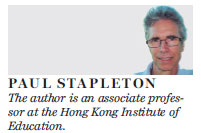We need to change our outdated attitudes to organ donations in HK
Updated: 2016-04-05 08:48
By Paul Stapleton(HK Edition)
|
|||||||||
We have just learned that the Hong Kong Hospital Authority plans to increase the chances of patients with kidney disease receiving a donated kidney. The new system would allow two potential recipients with incompatible next of kin to exchange donors so they can receive kidneys which match their blood and tissue types.
Undoubtedly, this is a step in the right direction given the exceedingly low donation rate in Hong Kong. Close to 2,000 people are presently waiting for a kidney transplant, yet last year, there were only 81 transplants, and of these, only 15 were from live donors, while the rest were from cadavers. In other words, fewer than 5 percent of those needing a kidney transplant can expect to receive one in any given year.
This dismal rate highlights not only a problem with kidney donations, but organ donations in general. In many countries, people can give their consent to donate their organs upon death by simply signing under a statement on the back of their drivers' license. Unfortunately, this simple option does not exist in the SAR.
The reasons for Hong Kong's low rate of participation in donations are many. However, traditional Chinese beliefs surrounding death and maintaining the integrity of the body probably account for much of the lack of participation. Perhaps sensing there is little enthusiasm among the public for a discussion over organ donations, the government has done little to generate any interest or debate. This is a pity because much can be done to increase donations.
Presently, Hong Kong has what is known as an "opt-in" system. This means potential donors need to be proactive in volunteering to register their consent to donate their organs. Although the government has made good efforts to facilitate the process via an online registry, it still has a low profile compared to other more user-friendly methods.
One such approach that Hong Kong could consider, still within the opt-in system, is to provide citizens with the option to sign a statement of consent on the back of their drivers' licenses or even their ID cards. Check a box beside a sentence or two, sign your name, and then forget about it for the rest of your life.
But there is an even better model that Hong Kong could aim for. Spain has developed an exemplary approach. Rather than having an opt-in system, they have an "opt-out" one. In other words, the system is defaulted in a way that everyone is a potential donor unless they proactively choose to deny consent. This is somewhat equivalent to having a statement like the following on the back of your driver's license or ID card: "Sign below if you do not consent to donate your organs."
Here in Asia, Singapore has taken the lead in also having an opt-out system since 2009. However, their experience has not panned out as have been expected. Donation rates remain low there despite their forward-looking policy, which shows that even under an opt-out system other factors are at play. In Singapore's case it has nothing to do with Chinese culture because only about 3 percent have chosen to opt out. Rather, it is the practices of the medical professionals who have not fully embraced a culture of donations. Thus, besides devising policies to encourage more donations, authorities need to follow through and educate doctors about the potential to save a life at the moment when one is being lost. But such education need not stop with doctors. The entire population needs to be made aware of the great gift that can emerge from tragedy, and this means government involvement.
There is no doubt that organ donation involves very delicate psychological and ethical issues that must be treated with great sensitivity. This may especially be the case here in Hong Kong where taboos surrounding death are quite pronounced. However, in an era in which enormous amounts of money are expended to prolong the lives of the very elderly and terminally ill for very limited amounts of time, organ donations offer the potential to extend the lives of those with a single failed organ for decades.
Thus, the government should initiate a public consultation with a view to encouraging more donations which have the potential to not only save dozens, if not hundreds of lives, but to significantly improve the quality of life of their families.

(HK Edition 04/05/2016 page10)